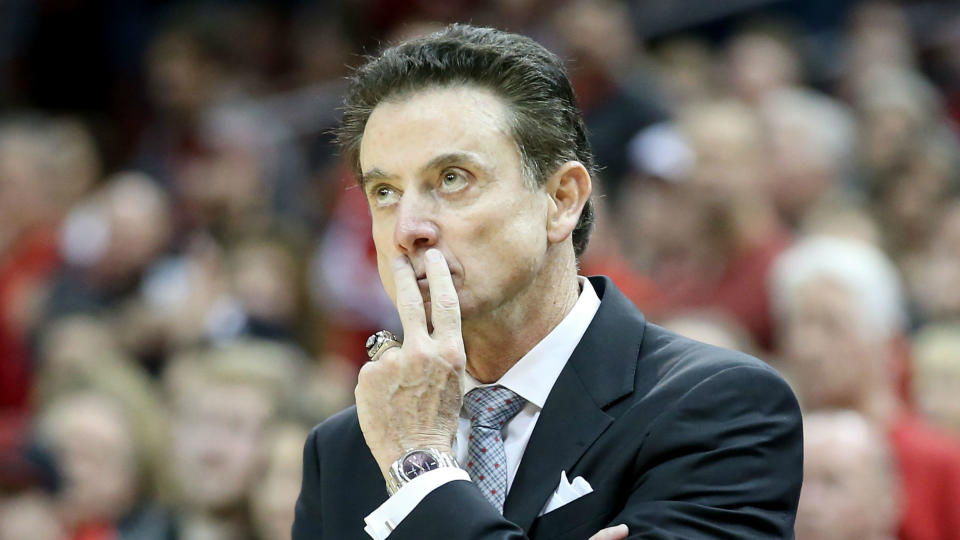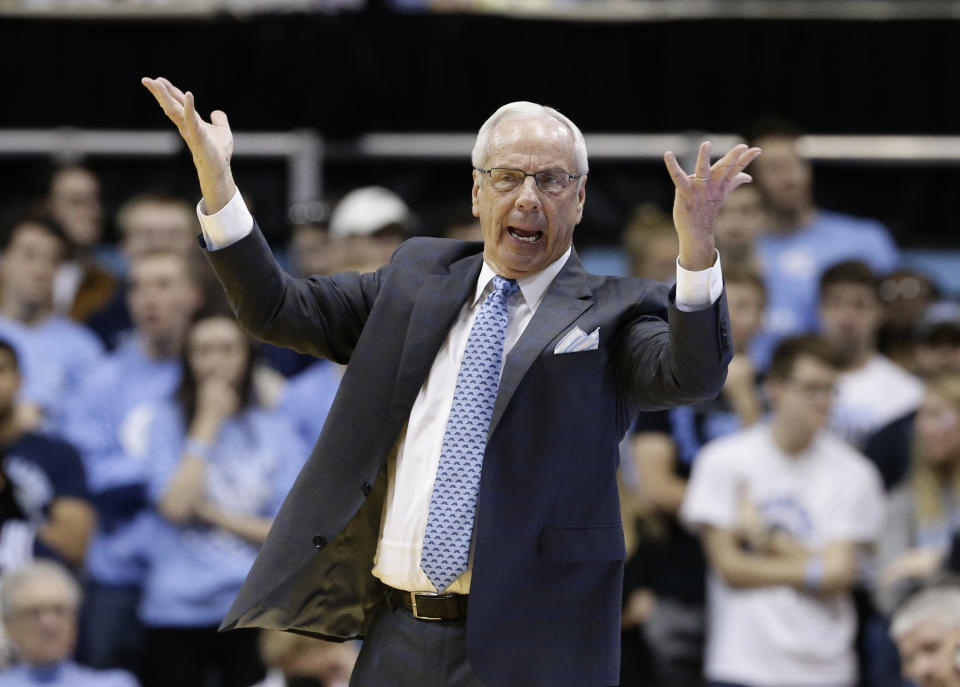Naismith Hall of Fame's 'Pitino Rule' doesn't go far enough

The Naismith Memorial Basketball Hall of Fame took a half-step toward fixing its most glaring and embarrassing problem Tuesday. It should have gone further.
Basketball’s Hall announced that, effective in 2020, it is raising the minimum age for inducting coaches, from 50 to 60, in addition to 25 years of coaching experience. That’s a start on correcting the credibility-damaging practice of inducting coaches who taint their careers with NCAA violations and other scandals. But it doesn’t take the very easy, very sensible next step:
Don’t enshrine active coaches. Period.
Active players cannot be voted into the Naismith Hall of Fame. (Or the baseball hall of fame, or either football version — pro or college.) Why the double standard for coaches, especially in a perennially dodgy sport where NCAA problems are seemingly just an FBI wiretap — or a tell-all escort, or a fraudulent ACT score — away?
I asked John L. Doleva, President and CEO of the Hall. He provided an answer Tuesday via email:
“Rationale: The Election Process Committee (EPC) debated whether all coaches who might be nominated should have to wait for their retirement plus three seasons for first consideration. This action could place many coaches into the 70 and maybe even 80-year-old age group before they would become eligible; players are now typically in their late 30’s and 40’s. It was pointed out that as coaches retire, they ‘fade’ from view much quicker than players, especially at such a potential advanced age; this was deemed unfair by the EPC. The committee wanted to see deserving active coaches able to be recognized but with a longer runway of time to evaluate their careers hence the age 60 minimum.
“One issue that the EPC was concerned about is having active younger coaches — perhaps in the early 50’s, be elected to the Hall of Fame and then for the remainder of their career — which could be 20 or more years — have the ‘unfair advantage’ of the moniker ‘Hall of Fame Coach’ as they were in homes recruiting young players. The age minimum moves that concern further out in their careers to diminish that advantage.”
Left unwritten: This is a move to lessen the retroactive impact of scandal. Jerry Colangelo, chairman of the HOF, at least hinted at that in the organization’s release Tuesday: “The Board has agreed that it’s best to evaluate a more complete body of work when considering coaches for Hall of Fame nomination, thus the implementation of the new minimums – 25 years of coaching and 60 years of age.”
Waiting until career’s end, even if coaches are old men, is still a better methodology. The HOF’s own standards should be the most important element; not the relative age and infirmity of its inductees.
Just take a look at which active college coaches were enshrined between 2005-15:
Jim Boeheim was voted into the Hall of Fame in 2005. Ten years later, the Syracuse coach was hit with a nine-game suspension for violations within the program, among other sanctions. The school already had self-imposed a postseason ban for the 2014-15 season — the second postseason ban of Boeheim’s tenure at the school.
Jim Calhoun was voted into the Hall in 2005 as well. Six years later, the Connecticut was suspended by the NCAA for failing to promote an atmosphere of compliance within his program, after a Yahoo Sports story about a booster/agent providing impermissible benefits to a UConn player. And a year after that, Calhoun’s team was hit with a postseason ban for having a low Academic Progress Rate. He retired before having to face the music from that latter mess.
Roy Williams was voted into the Hall in 2007. A decade later, much of America was outraged when Williams’ North Carolina program escaped NCAA sanction for 18 years of academic fraud at the school.

Rick Pitino was voted into the Hall in 2013, with the announcement coming on the same day his Louisville team won the national championship. Today, the school is awaiting final word on whether it must vacate that title for the “StripperGate” scandal that broke in 2015. And then there is the fresh federal investigation that has ensnared Louisville, with allegations of agreements to pay six figures via Adidas to one current Cardinal and one prospective recruit.
(Given the timing, it seems that Pitino’s still-growing baggage might have been the impetus for this new rule. Yet even that wouldn’t have kept Pitino out — he was 60 years old when voted into the Hall.)
John Calipari was voted into the Hall in 2015, despite twice having Final Fours vacated for violations within his program at Massachusetts and Memphis.
If put to a vote today, would all these men still be enshrined? In Calipari’s case, his NCAA issues were known and ignored for whatever reason. The rest of them all had legacy-altering situations blow up after being awarded with what many coaches consider the highest honor in their profession.
If that’s who the basketball Hall of Fame wants to be, well, I suppose it is thematically consistent with the ethos of the college game. It leaves the organization susceptible to retroactive red faces over a rogue inductee — or group of them — but this is a sport with a remarkably high degree of tolerance for scandal.
The other pressing question here: who does the voting? The HOF’s response: none of the public’s business.
The entire process remains shrouded in secrecy. The members of the HOF’s screening and honors committees are kept private.
“We believe confidentiality ensures voters will not be influenced by outside pressures,” Doleva wrote.
That’s some serious self-importance, especially given the increasingly public nature of the voting that goes on in the football and baseball halls of fame. (Some baseball voters tweeted their ballots this week, in fact.)
This is not a matter of national security, or even national policy. This is sports. If congressional votes on health care and tax bills can be public, surely America should be able to find out who did and didn’t vote for 2017 Naismith inductee Bill Self. Or, at the very bare minimum, simply who comprises the committee.
Thus far, the Kansas coach hasn’t been caught up in the ongoing federal probe of college hoops. If that changes, hey, he’d just be one more Hall of Famer with a rap sheet, something the sport is clearly willing to tolerate.
A simple solution is available, and the HOF moved toward it Tuesday — but not far enough.
Popular basketball video on Yahoo Sports:
More from Yahoo Sports:
• NFL Power Rankings: Don’t forget about Cam
• Inspired by Kobe, superfan has lost 170 pounds
• Nance posterizes Durant, Lakers bench goes nuts
• Eli Manning: ‘I think it’s clear what a catch is’

